Augustana’s Cooper Brings Maria Callas To Life At Moline’s Black Box Theatre
Shelley Cooper is a great admirer of legendary opera singer Maria Callas (1923-1977), who truly had an epic, operatic life.

Shelley Cooper has taught musical theater and directed at Augustana College since 2017.
The multi-talented, 35-year-old Augustana assistant professor of theatre arts is bringing her one-woman, one-hour tribute to Callas this weekend to Moline’s Black Box Theatre.
“La Divina: The Last Interview of Maria Callas” will be performed at 7:30 p.m. Friday and Saturday, and 2 p.m. Sunday, at 1623 5th Ave., Moline. Audiences will be limited to 30 patrons; temperatures checked at the door, and Cooper will wear a clear plastic face shield while performing. She credited theater co-owner Lora Adams for keeping everyone safe during Covid.
“Lora has been really great at problem solving, keeping the integrity of the show, but also, audience safety is number one for all of us on board,” Cooper said this week. “I wear a face shield, and any time I sing, I always go a little further upstage, so I’ve got a shield on and I’m really far away from my audience.”

Cooper as legendary opera singer Maria Callas, who died in 1977 at 53.
“When I’m speaking, I’ll be a little bit closer, but then when I’m singing, I’m almost as far as you can get away – you’ll still be able to see me – but far enough away from the audience so that there’s no concern,” she said. “With operatic singing, it’s a lot of aerosols that can go out.”
Fortunately, Cooper also is 100% vaccinated. She planned to do the intimate show at the 60-seat Black Box last fall, but the Monday before her November premiere decided to postpone, since Covid cases were spiking in the area.
Because of that, it actually worked out better for Cooper, since one of her close friends from college (Hanover in Indiana) is Luke Tyler, who teaches piano at Loras College in Dubuque, and will accompany her for the show. This will be the first time he’s played for “La Divina,” which she premiered in 2010 in Orlando, Fla.
“Getting to make music with someone – the two of us just know each other so famously. That’s
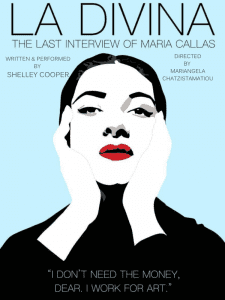
The poster for “La Divina: The Last Interview of Maria Callas.”
been really pleasant and that wouldn’t have been the case in November.”
In “La Divina” (meaning “the divine one,” the regal nickname given to Callas), Cooper includes stories and ‘70s-era interviews from her life and famous iconic arias that she was best known for singing – including from “Carmen,” “Tosca” and “Gianni Schicchi.”
At University of Central Florida (where she got her master’s in musical theater), Cooper wrote her 2010 master’s thesis on Callas, whom she said “stressed the importance of understanding and interpreting text and music with precision, detail, specifics and artistry. Her techniques set the standard for future aspiring singer/actors.”
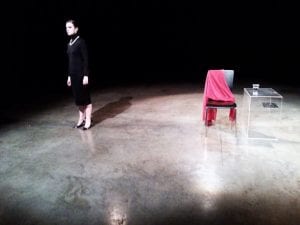
In the one-woman show at Black Box, Cooper will wear a clear face shield.
By the 1970s, Callas lost her ability to sing, so she led master classes at the Juilliard School of Music, which inspired Tony-winning playwright Terrence McNally’s biographical play, “Master Class.”
In 2010, Cooper was performing at Disney World, Universal Studios, Orlando Rep and University of Central Florida.
“What’s so interesting, ‘La Divina’ came out of a rejection,” she recalled. At first, she was to write a thesis on the evolution of the ingenue in operetta and musical theater, hoping to play Mabel in
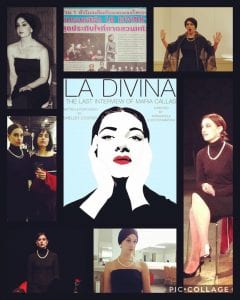
A collection of images from Cooper’s productions around the world.
“Pirates of Penzance,” but didn’t get the part.
“I ended up coming up with this instead,” Cooper said about Callas, giving herself the challenge of writing her own show and performing it. She had been in the play “Master Class” her senior year of college (at Hanover in southern Indiana) and always loved Callas.
“I brought this idea to my chair and he enthusiastically thought it was just a great idea,” Cooper said. “I really pushed myself and that’s what your master’s thesis should be and that’s what art should be doing. At the of the day, I’m really glad I didn’t get cast in ‘Pirates of Penzance,’ so that I could write this show.
“It’s one of my greatest accomplishments and it’s something I’m really proud of,” she said. “Master Class” — the 1995 play — took more liberties with the opera singer’s life, painting her as less sympathetic, Cooper said.
“She really wasn’t as mean as she came off in the play ‘Master Class,’ so I was trying to I guess be her defense attorney in a sense, as I was writing ‘La Divina’,” she said. “I’m very much a champion of Maria Callas, not to say she didn’t have diva tendencies, but to know the other side of the story – why she was the way that she was.”
Who Callas really was
Born in Manhattan to Greek immigrant parents, Callas was raised by an overbearing mother who had wanted a son, according to a bio. Maria received her musical education in Greece at age 13 and later established her career in Italy.

Terrence McNally’s 1995 play, “Master Class,” depicted the soprano teaching at Juilliard as a commanding, demanding, larger-than-life presence.
Forced to deal with 1940s wartime poverty and with near-sightedness that left her nearly blind onstage, she endured struggles and scandal over the course of her career. She notably underwent a mid-career weight loss, which might have contributed to her vocal decline and the premature end of her career, in 1965.
Apparently Callas didn’t like the sound of her voice much. The conductor Carlo Maria Giulini described it this way:
“It is very difficult to speak of the voice of Callas. Her voice was a very special instrument. Something happens sometimes with string instruments—violin, viola, cello—where the first moment you listen to the sound of this instrument, the first feeling is a bit strange sometimes. But after just a few minutes, when you get used to, when you become friends with this kind of sound, then the sound becomes a magical quality. This was Callas.”
Controversies surrounded her behavior, including a supposed rivalry with Renata Tebaldi and her love affair with Greek shipping tycoon Aristotle Onassis.
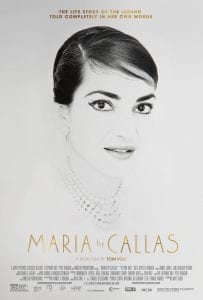
The poster for the 2017 documentary, “Maria By Callas.”
Composer and conductor Leonard Bernstein called her “the Bible of opera” and in 2006, Opera News wrote of her: “Nearly thirty years after her death, she’s still the definition of the diva as artist—and still one of classical music’s best-selling vocalists.”
A 2017 documentary, “Maria by Callas,” revisits many of the most notable controversies of Callas’s life, including a conflict with the Metropolitan Opera’s Rudolf Bing, and demonstrates that, “while Callas was a demanding perfectionist, she was neither capricious nor someone who made trouble for its own sake.” The film also sheds new light on Callas’s relationship with Onassis, the supreme love of her life.
“Callas believed that two different women lived in her,” a film synopsis says, “Maria, the woman who longed for a normal life; and Callas, the public figure and icon, from which an adoring public expected a transcendent experience every time she stepped onstage, and which could quickly become outraged when they felt she had given them anything less.”
Filmmaker Tom Volf’s intimate portrait of Callas shows that her reputation as a “tempestuous” diva has no basis in fact, the film website says. Cooper agrees.
Though the term “diva” is often derogatory, she thinks Callas – who died at 53 from a heart attack — should be lauded.
“She was a constant, consummate professional,” Cooper said. “So in terms of diva, she was going to show up to rehearsal on time, off book, knew her music, knew her translations, knew her drama. So a lot of times, the diva phrase is the opposite of what I just said. And that was

Callas (1923-1977) was one of the world’s most renowned and influential opera singers.
never Callas. Callas always knew her music – she knew every nuance of her music. She was a conductor’s dream, because she knew all the nuances of the score.”
“She prepared to go to rehearsal as if she was preparing to get married,” she said. “She said it, like she’d get dressed up to go to rehearsal. She would never come in without makeup on, looking like a mess. She believed the rehearsal room was sacred, that you should treat it with thew utmost respect. So, there are some diva tendencies in there.”
“At the end of the day, she always fought for the beauty of the production. She fought to get it as close to perfection as possible,” Cooper said.
Beyond her stunning operatic ability, Cooper envies Callas in other ways.
“I wish that I could be much more unapologetic, because she truly was – what you saw is what you got out of Callas. I mean, no one walked
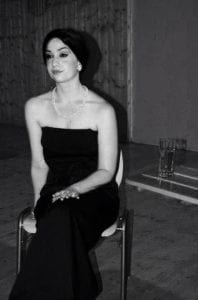
Cooper as Callas addresses some of the controversies in her tumultuous, operatic life.
all over her. Man, I’ve got Midwest nice down to a T, and so I can be strong when I need to be. I have that kind of Midwest nice thing happening and I think there are some really strong traits – she knew what she wanted; no one was gonna walk all over her. And when she walked in a room, everyone paid attention.”
“La Divina” doesn’t reflect one specific interview, Cooper said, but it includes some responses to “60 Minutes” interviewer Mike Wallace, who was unkind to Callas — but is unheard in the show.
Wallace talked about the gossip — how she was a diva, her affair with Aristotle Onassis, how she got fired from the Met, Cooper said.
“All of that kind of trashy, tabloid – the things that Americans find interesting,” she said.
“I’m constantly seeing this person; it’s who I’m speaking to in the scenes, but you never see him, you never
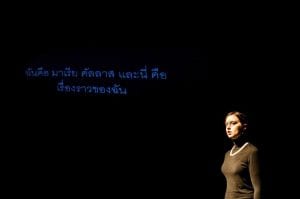
In Thailand, Cooper performed the show with Thai supertitles translated by her university students.
hear him,” Cooper said of the play. “I make reactions and I’m clearly listening to someone, but the audience never hears the other side.”
“There was a lot of drama in her personal life, but it caused her to be very independent,” she said. “She was one of the first singers that worked as her own agent for a while, and stood up for herself. But also I think that the things that happened to her, you can really see that if Maria Callas wasn’t a woman, this wouldn’t have happened. There’s that double standard – like there was so much pressure put on her because she was a woman as well.
“There’s all this stuff now coming out about male classical singers and male conductors, but it wasn’t coming out in the ‘60s and ‘70s; it was all about the women,” Cooper said. “So it makes me think a lot of it wasn’t her fault, it was just circumstances, how her life was painted.”
Divine performances on three continents
She premiered her one-woman show at the Orlando Repertory Theatre Black Box in October 2010, and Cooper has done it on three continents.

Cooper will bring “La Divina” to the Orlando Fringe Festival in late May.
That includes in 2011 at the International Performing Arts Institute in Bavaria, Germany; in 2014, she did it at Bangkok Theatre Festival, and spring 2015 in Chiangmai, Thailand. Cooper taught at a university in Thailand from 2013 to 2015.
Her first year at Augustana, she did it in the Brunner Black Box Theatre in December 2017, and the same month at the Retzhof Castle near Graz, Austria as a part of the International Global Theatre Experience.
People in Thailand, “they love an entertaining show and they love music,” Cooper recalled. “The show expresses that. The tunes that are in the show are all extremely familiar, and I do that on purpose. A lot of those tunes are pretty universal.”
In Thailand, her students translated the show, so she had Thai supertitles on a screen behind her. “That was a really cool experience,” Cooper said of Chiangmai in northern Thailand.
“It’s not necessarily Thailand that made it special; it was the connection I made with Mariangela, my director from Greece, and I made that connection when I was in Thailand,” she said of Mariangela Chatzistamatiou. “My work with her really made this special because she grew up idolizing Callas, as a Greek soprano herself.”
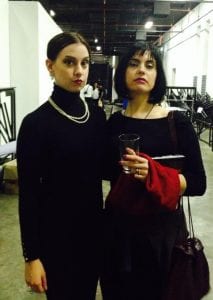
Cooper, left, and her Greek director make their best Callas faces.
“I couldn’t have asked for something better than that,” Cooper said. She was introduced to Callas later in life (at 18), whereas for her director, it was ingrained with her as a child. “In America, Callas was thought of as an opera diva, but she also had an affair with Aristotle Onassis, the gossipy stuff.”
The direction that Cooper uses now is Mariangela’s, she said.
Callas died young, at 53, because of a heart attack. Cooper said some people think she died of a broken heart, never getting over Onassis – who was married to former first lady Jackie Kennedy and died two years earlier, in 1975 at age 69.
Callas was a smoker and had sung very demanding roles at a young age, and she lost 60 pounds in one year, Cooper said.
“No one knows 100 percent what caused the decline, but you can kind of look at – OK, smoking, there’s some different indicators that can kind of tell you,” she said. “Singing really big rep when you’re 19 years old.”
“I can’t imagine tackling anything like that – I think I had sung an aria when I was 19 years old,” Cooper said.
After directing the musical “Beehive” at Circa ’21 – which opens in previews May 19 – she will head back to the Orlando Repertory Theatre later that month, to perform “La Divina” during Orlando Fringe, back where it all began.
Tickets for the Black Box “La Divina” are $16 each, available at www.theblackboxtheatre.com.











